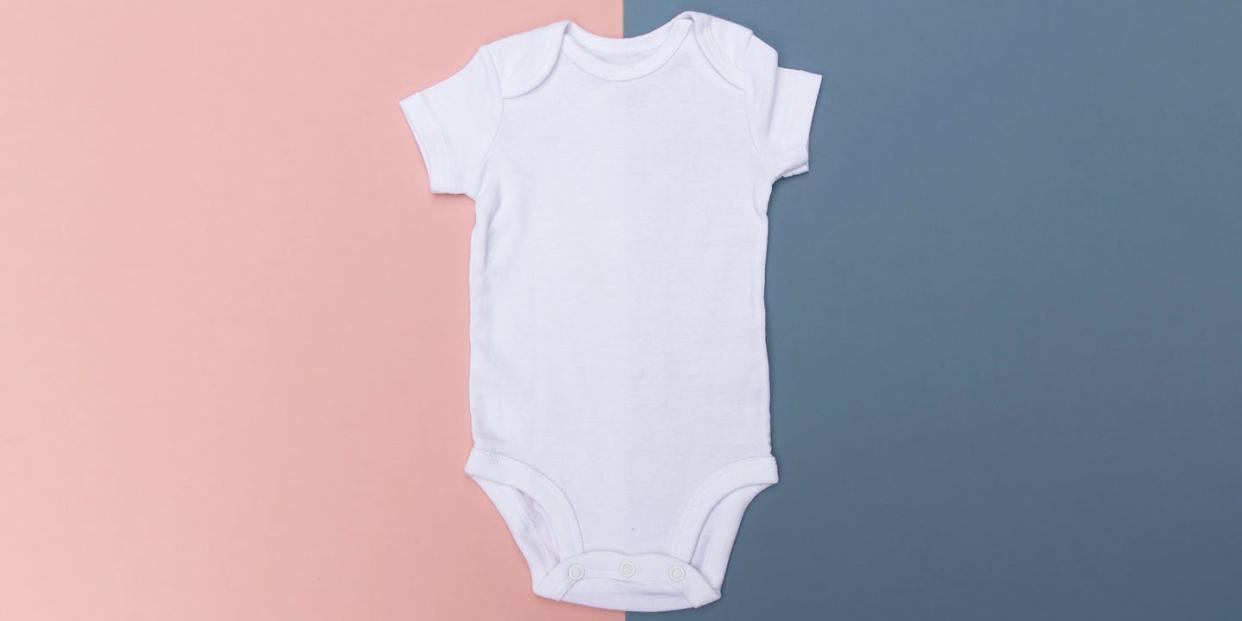This is why the woman who started the gender reveal party trend regrets it

Considering gender reveal parties have the potential to be incredibly Insta-worthy, it makes sense that the trend has grown into what it is today. So many celebrities throw them, including Made in Chelsea's Binky Felstead who orchestrated a mass of pink confetti to fall down from the ceiling to announce she was having a girl. Kevin Jonas had his two-year-old daughter hold a pink 'baby girl' balloon to confirm his second baby was also a girl. You just have to search 'gender reveal party' on Pinterest to find hundreds of pins of ideas on how to throw the 'perfect' party. Results are a sea of blue and pink decorations, cakes, and one woman even made a half-pink-half-blue dress for the occasion.
These parties, on first glance, may seem like a cutesy, harmless way of celebrating bringing new life into the world. But for many reasons (mainly that they rely on patriarchal gender stereotypes) the gender reveal party isn't as innocent as you might think. And the woman whose own gender reveal party sparked the trend has said she regrets it in a new interview with The Guardian.
Jenna Karvunidis baked a cake with pink icing back in 2008 to announce to her family she was having a baby girl. She wrote about the party on her blog, which was then picked up by a pregnancy magazine, and the trend was born. Some people took their parties to the extreme: including Dennis Dickey whose gender reveal announcement (which involved him shooting at a target loaded with a homemade explosive packed with blue powder) started a fire that destroyed a LOT of Arizona forest, and cost more than $8million to extinguish.
Jenna had previously explained how she inadvertently started the trend. “I had had several miscarriages. It was like, ‘Oh yay, I’m finally at a point in my pregnancy where I know if it’s a boy or a girl’ rather than ‘Let’s saddle this kid with a whole identity’. I don’t think anybody was thinking like that in 2008,” she told the newspaper in July this year. “Then I started to realise that non-binary people and trans people were feeling affected by this, and I started to feel bad that I had released something bad into the world,” she said.
Now, in a new interview, she says she's not only worried the trend she helped to make so popular actively harms trans and non-binary people. But that gender reveal parties help people reduce sex and gender down to two options: pink or blue, boy or girl. And that this automatically imposes an identity and set of expectations on that unborn human. "It’s not a football player or a ballet dancer, it’s a foetus, but the gender reveal helps people forget that,” she said.
cis folks make gender reveal explosives in their garages, ask invasive questions about people's genitals, and awkwardly stare at everything they don't like
but WE'RE the ones making THEM uncomfortable... alright— T🎃ni (@ToniQueene) October 15, 2019
Let’s tone down the gender reveal parties pic.twitter.com/ohIGiFq81d
— Denlesks (@Denlesks) October 12, 2019
When her younger daughter threw a tantrum because she didn't want to play with Lego because she considered it a "boy's toy", Jenna realised the whole pink and blue thing is far too reductive. She said she's also learning from her eldest daughter, Bianca, now 10, who she threw the party for that sparked the trend.
“Bianca tells me there are more than two genders and many sexualities. I hadn’t considered all this before. At least when the child is born you are getting all the information at once: the sex, the colour of their hair, who they look like, how long they are, what their heart rate is. With the gender-reveal you’ve isolated one aspect of this person. When it gets elevated as being central to your identity that’s problematic.”

At a time where a number of so-called feminists (TERFs) exclude trans women and non-binary people from their feminism, and where trans people are attacked both physically and verbally, on the street and online, it's more important than ever to be aware of how we talk about gender - and present it as a spectrum rather than binary.
In 2017, a Stonewall report looking into the hate crimes LGBTQ+ people face in the UK found two in five trans people had experienced a hate crime or incident because of their gender identity in the last 12 months. In 2018, a report looking into trans peoples' experiences in the UK found 34 per cent of trans people had been discriminated against because of their gender identity when visiting a café, restaurant, bar or nightclub in the last year. 48 per cent didn't feel comfortable using public toilets through fear of discrimination or harassment. And 44 per cent avoid certain streets because they don’t feel safe there as an LGBT person.
Read The Guardian's full interview here.
You Might Also Like

